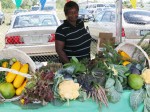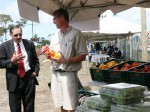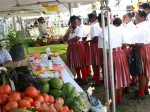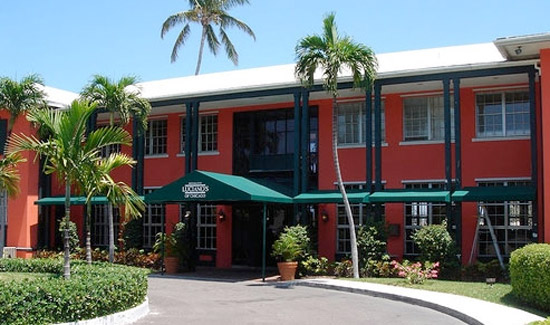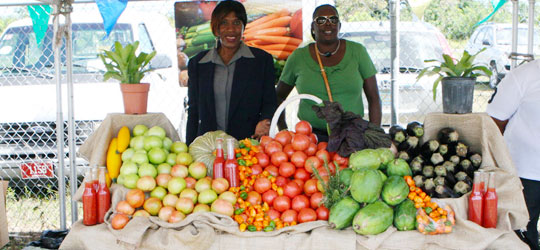
The Ministry of Agriculture and Marine Resources kicked off this year’s all-Bahamas Agribusiness Expo with a three-day food fair in New Providence last weekend.
The Expo moves next to Eleuthera’s Bay Front Park in Governor’s Harbour on March 8 and to North Andros’ Nicholls Town Auditorium on March 9.
The New Providence fair showcased a wide variety of fruits, vegetables, meats, processed foods and handicraft made in The Bahamas.
It also brought together farmers, processors, wholesalers, retailers and householders from throughout the island.
“The Government recognises that food security is a goal that can be achieved within the peculiar environmental, economic and cultural context of the country,” said Agriculture and Marine Resources Minister Lawrence S ‘Larry’ Cartwright.
“Therefore we are continuing our efforts to put all agricultural lands under production of livestock and crops that are able to perform well in our climate and provide our population with safe, nutritious and affordable food.”
This year’s theme is ‘Progressing Toward Food Security’.
The New Providence-based expo was started in November 2007 and expanded to the Family Islands in early 2010.
The main purpose was to showcase producers and entrepreneurs in fishing, agriculture, ranching, new technologies, handicraft and other agri-businesses.
These events showcased their products, encouraged potential agribusiness entrepreneurs, raise the level of appreciation for Bahamian grown, processed and locally made commodities, and secure a greater linkage among the agriculture, education, marine resources, light industry and tourism sectors.
The Ministry, being the country’s major vehicle for transformation of the agricultural and marine resources sector, said Mr Cartwright, has consistently maintained programmes designed to enhance the ability of farmers and fishermen to increase output, improve quality, and market competitively.
Within the past five years alone, he said, the cumulative annual budget for the Ministry and its departments has been some $93.35 million, with $18 million being allocated for the capital and $75.35 million for the recurrent expenditures.
“This significant injection of scarce capital resources into the agricultural sector has been effectively utilised to provide, at cost to farmers, inputs such as seed and planting material, fertiliser, livestock feed, agricultural chemicals and packaging material,” said Mr Cartwright.
Additionally, a significant proportion of the funds are used to employ a cadre of scientists, professionals and technicians trained in marine technologies, crop and livestock production, and food technology.
Funds have been used to purchase produce from farmers for resale to the domestic market, and also to subsidise the cost of land preparation and the development of farm feeder roads, he explained.
He referred to the Ministry’s Rapid Assessment Exercise, the result of which provided a blueprint for a five-year period. It has been widely discussed and disseminated, he said.
Projects and programmes undertaken by the Ministry, consistent with the Rapid Assessment recommendations are:
- Extensive renovations to the Produce Exchange in Freeport, Grand Bahama, while continuing with on-going renovations of the Produce Exchange in New Providence.
- Upgrade of the abbatoir, including the installation of a new incinerator and the purchase of a new dehairer and scalding machine.
- Completion of draft plant protection, animal health and food safety legislation.
- Completion of a land audit exercise as well as census of all agricultural lands.
- Establishment of several marine parks and continued efforts with respect to establishing additional parks.
- Enactment of the Animal Control and Protection Act which is now in force for New Providence.
A lobster Fisheries Improvement Project (FIP) aimed at bringing the Bahamian spiny lobster fishery up to Marine Stewardship Council (MSC) certification standards was initiated in 2010 and has seen significant progress, said Mr Cartwright.
“To-date a number of discussions and workshops have been held among stakeholders,” he said. “Research have been conducted as well, such as the completion of a stock assessment for the lobster fishery, the completion of research attempting to shed light on the extent of illegal, unreported and unregulated fishing of lobsters in The Bahamas, and research to investigate the presence of a spiny lobster virus in The Bahamas.”
The Ministry is also continuing in its efforts to address the invasive Indo-Pacific Lionfish, identified as “a major threat to the Bahamian ecosystem and human health,” said the Minister.
With the assistance of the Global Environment Facility various workshops and projects have been undertaken which focused on research, training and designing management techniques to control the proliferation of the invasive lionfish, he said.
The Ministry’s Backyard Gardening initiative which was introduced during 2008 to stimulate production in the agricultural sector, has been embraced by a number of persons who are now actively growing local produce in their backyards, said the Minister.
The Ministry recently held a Country Programming Framework (CPF) Workshop with key stakeholders within the Ministry to identify projects for which the Food and Agriculture Organization (FAO) could offer possible technical assistance.
Prior to this meeting several discussions involving critical stakeholders such as staff, farmers and fishers from New Providence and the Family Islands were conducted by FAO consultant Michael Pintard.
The CPF, a tool to prioritise FAO assistance to the Bahamas at the country-level, is an agreement between FAO and the national government and covers a period of up to five years.
The process involves dialogue between FAO and government, development partners and other national stakeholders and promotes collaboration towards common and agreed objectives.
The CPF is a useful working tool because it enhances timeliness and quality of FAO’s work since it allows for a more focused and rationalised planning of resources, identifies those priorities in which all FAO projects and activities are expected to follow and contribute with concrete results, said Mr Cartwright.
As a result key stakeholders within the Ministry were able to identify five central priority project areas.
- Formulation of fisheries and aquaculture policy.
- Support to negotiate and implement trade agreements.
- Transformation of the Packing House and Produce Exchange.
- Forestry Pilot Project which seeks to train rangers and forestry staff, conduct inventory of forestry stock, and explore establishment of a lumber industry through sustainable harvesting of trees.
By Gladstone Thurston
Bahamas Information Services

